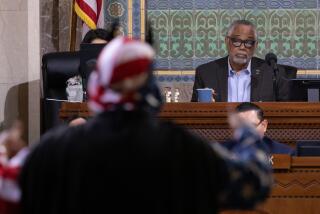Mayor of Birmingham Is Sent to Prison : Courts: The city’s first black chief executive will serve time on weekends for contempt. He claims the citation is racially motivated.
- Share via
BIRMINGHAM, Ala. — Richard Arrington, the first black mayor of this city that became a symbol of the civil rights battles of the 1960s, went to prison for contempt of court Thursday amid emotional charges that he was railroaded because of his race.
The contempt citation stems from Arrington’s refusal to obey a federal grand jury subpoena for his appointment records, which are being sought as part of an investigation into allegations that he took $5,000 in kickbacks involving city contract work--a charge Arrington denies.
With about 45 minutes to spare before a 5 p.m. deadline, the 50-year-old mayor, surrounded by hundreds of supporters--some wearing symbolic chains--marched under leaden skies from a rally and turned himself in to federal authorities, who were to take him to a federal prison in Montgomery, Ala.
He is scheduled to serve time from 5 p.m. each Thursday until 8 a.m. the following Monday, leaving him most of the week to run the city. Also, he is being fined $1,000 a day for each day he ignores the subpoena. Attorneys say the sentence will last until May, when the grand jury session ends.
The rally was held at the 16th Street Baptist Church, where in the 1960s, a racist bombing killed four black girls and where Dr. Martin Luther King Jr. organized powerful protests. Several speakers praised Arrington and assailed the judicial system that was about to lock him up because of its “klan mentality.”
“We’re tired of white folks acting like black folks don’t have no sense,” thundered the Rev. Fred Shuttlesworth, a noted civil rights activist.
A message urging the U.S. Justice Department to “intervene in the Birmingham controversy” because it has “severely polarized” the city was sent by John E. Jacob, president of the National Urban League.
A white downtown office worker, who asked not to be named, worried that the controversy will set the city back racially.
“Things have improved over the years,” he said. “I feel like he’s using the racial thing the same way white officials did back in the ‘60s.”
In choosing confinement instead of complying with the subpoena, Arrington hopes to gain attention for his contention that black officials nationwide have been victims of racist investigations.
He told the church rally: “We have a history of taking adversity and turning it into advantage. That is what we hope to do here.”
However, some political commentators questioned the effectiveness of playing the race card, pointing out that it reminds people that former Washington Mayor Marion Barry was convicted of cocaine use despite asserting that the charges against him were racist.
“This tactic is not as potent as it once was,” said William Boone, chairman of the political science department at Clark Atlanta University. “There is a strong strand of people who are beginning to say: ‘Look, you can’t use the race issue.’ They say: ‘The question is not whether you were targeted, but did you do it?’ ”
Thursday’s events were the latest skirmish in a seven-year war between Arrington and U.S. Atty. Frank Donaldson. Donaldson has launched about a dozen investigations of Arrington but has not succeeded in getting him indicted.
Tarlee Brown, an Atlanta architect and former partner of Arrington, has accused Arrington of accepting $5,000 in bribes on two occasions. Additionally, according to Brown, the mayor was to receive 25% of whatever Brown’s city contracts were worth.
David Cromwell Johnson, Arrington’s lawyer, said that Arrington was out of town on the dates Brown claims he gave money to the mayor. Still, he said, Arrington should not have to turn over his logs.
“The mayor’s fears are (Donaldson) will use the records to go and harass people,” Johnson said. “They’ve had him under a magnifying glass for years. He thinks they’re out to get him.”
Donaldson has repeatedly rejected that charge.
U.S. District Judge Edwin Nelson has said that Arrington can avoid imprisonment by turning over the records.
More to Read
Sign up for Essential California
The most important California stories and recommendations in your inbox every morning.
You may occasionally receive promotional content from the Los Angeles Times.













